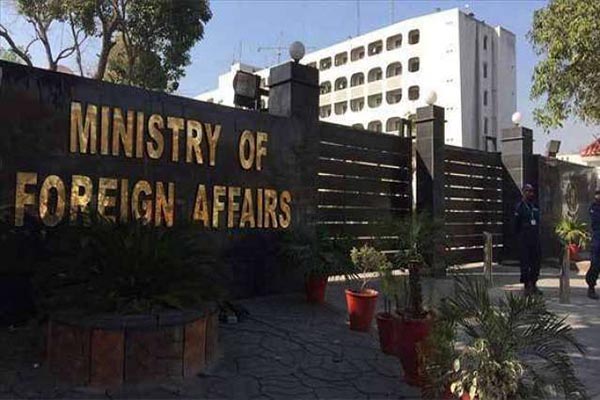
File photo
Foreign Office also rejects reference to Pakistan in India-U.S. joint statement
Pakistan on Wednesday categorically rejected India’s decision to amend land ownership laws in Occupied Kashmir, saying it was a “clear violation of U.N. Security Council resolutions, bilateral agreements between Pakistan and India, and international law.”
In a statement, the Foreign Office said the J-K Re-organization (Adaptation of Central Laws) Third Order, 2020 was “highly condemnable” and reminded Delhi that the valley is an “internationally recognized dispute under the relevant U.N. Security Council Resolutions and international law.” It reiterated that India’s actions of Aug. 5, 2019, when it unilaterally revoked the region’s special constitutional status, and the subsequent domicile and land ownership laws were aimed at “changing the demographic structure of IIOJK [Indian Illegally Occupied Jammu and Kashmir] to convert the Kashmiris into a minority in their own land.”
The statement stressed that demographic changes as evidenced by these moves were a violation of the 4th Geneva Convention and were akin to a war crime.
“All these measures and laws, lacking legal and moral legitimacy, are forced upon the oppressed people of IIOJK through the barrel of the gun with an unprecedented military siege in the most militarized zone in the world,” it said, adding that these moves cannot change the disputed nature of the region, or “prejudice the inalienable right to self-determination of the Kashmir people.”
Urging the U.N. and the international community to take “immediate action to stop India from changing the demography and distinct identity” of India-held Kashmir, the Foreign Office asked the global body to facilitate the resolution of the Jammu and Kashmir dispute as per the relevant UNSC resolutions and the wishes of the Kashmiri people.
The Foreign Office statement was in response to New Delhi, on Oct. 27, notifying a law allowing any Indian citizen to buy land in India-held Jammu and Kashmir, removing an earlier condition that individuals purchasing land in the region be permanent residents.
Unwanted reference
In a separate statement, also issued on Wednesday, the Foreign Office rejected as “unwanted and misleading” a Pakistan-specific reference in a joint statement issued by India and the U.S. after their 2+2 ministerial dialogue.
The joint statement had “called on Pakistan to take immediate, sustained and irreversible action to ensure that no territory under its control is used for terrorist attacks, and to expeditiously bring to justice the perpetrators and planners of all such attacks, including 26/11 Mumbai, Uri, and Pathankot.”
“We take strong exception to Pakistan-related assertions made in the selective and one-sided Joint Statement, devoid of meeting the ‘objectivity criteria,’” read the Foreign Office rejoinder. “Failing to take cognizance of the grave humanitarian and human rights situation in the Indian Illegally Occupied Jammu and Kashmir, further aggravated by India’s unilateral and illegal measures of Aug. 5, 2019, is tantamount to abdication of international responsibility,” it added.
Criticizing the joint statement’s “gratuitous and self-serving references,” the Foreign Office said this could not hide Indian state-terrorism in South Asia, including in India-held Kashmir. It also accused India of being a “safe haven for the perpetrators of hate crimes against Muslims and Islamophobia.”
Stressing that India’s bid to project itself as “victim” of terrorism was not sufficient to divert global attention from its gross human rights violations in India-held Kashmir, the Foreign Office stressed that the international community recognized Pakistan’s efforts, sacrifices and success in the fight against terrorism.
“As a country that has suffered the most from cross-border terrorism, Pakistan would continue to contribute constructively to regional and global efforts to promote peace and stability in the region,” it said. “It is important that partner countries take an objective view of the issues of peace and security in South Asia and refrain from endorsing positions that are one-sided and divorced from ground realities,” it added, in a clear message to the U.S.
